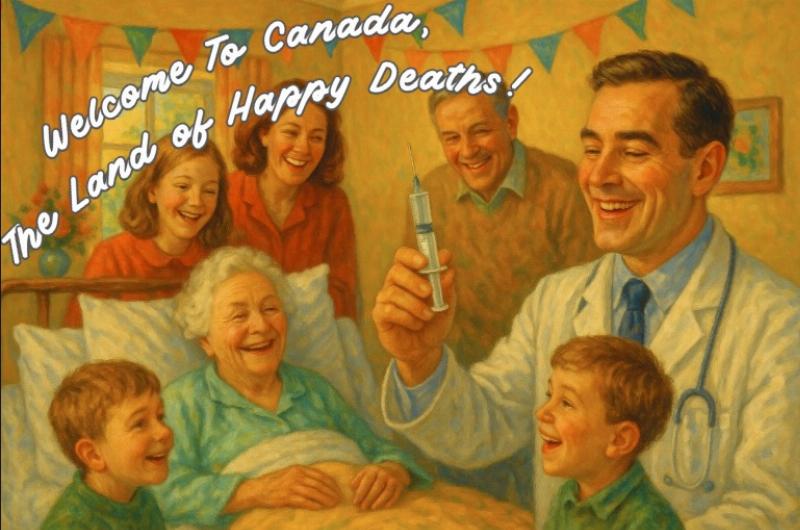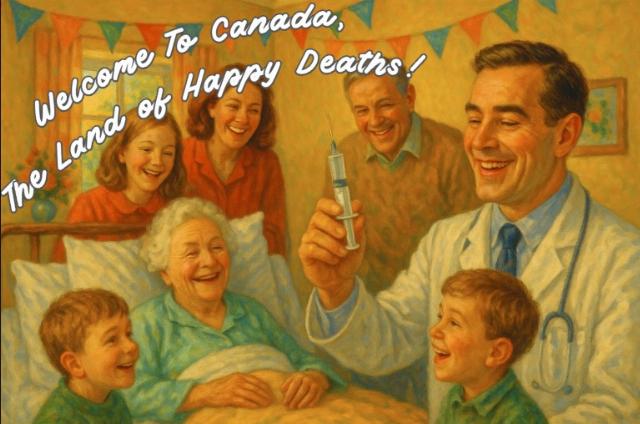


In the brilliant book MASH, by Richard Hooker (real name H. Richard Hornberger), Captain Walter “The Painless Pole” Waldowski, a brilliant, handsome, and priapic surgical dentist, suffers from what today would be diagnosed as bipolarism, periodically becoming deeply depressed. His doctor friends offer him the ultimate suicide, complete with a huge party and a painless final shot. In fact, it’s a con, for they simply knock him out to help him sleep off his depression, and they even give the well-endowed dentist a blue ribbon award while he sleeps. All ends well.
The 1970 movie kept that scene, and even composed a song for it, “Suicide is Painless,” which went on to become a big hit, with the melody becoming the theme for the long-running MAS*H TV series. The lyrics were deliberately made banal and utterly stupid:
[The director, Robert] Altman attempted to write the lyrics himself, but, upon finding it too difficult for his “45-year-old brain” to write something “stupid” enough, he gave the task to his 15-year-old-son Michael, who reportedly wrote the lyrics in five minutes.
The chorus, which some of you probably remember, goes this way:
That suicide is painless
It brings on many changes
And I can take or leave it if I please
Nowadays, thanks to modern medicine, suicide really is painless. People are knocked out, given numbing agents to prevent even subconscious pain from the final shot, and then killed. However, unlike The Painless Pole, you can’t “take or leave it” as you please. Once you sign on, it’s a one-way ticket out of life.
And in Canada, where it’s been legal for nine years, euthanasia is extremely popular. In a chilling essay at The Atlantic, Elaina Plott Calabro takes us to the annual Euthanasia Conference, which has the cheerful normalcy of any other medical conference, complete with seminars and networking.
And no wonder it’s a cheerful place. It turns out that business has never been better, with MAiD (Medical Assistance in Dying) accounting for 1/20 deaths. Within a short time of passing its suicide law nine years ago, Canada changed the law so that it went from aiding terminal ill patients who were already in the final throes of dying to now making it available to just about everyone, with some doctors—the same people who once took oaths to “first, do no harm”—having killed hundreds of people.
Like The Painless Pole, the media was filled with reports of people preparing for their MAiD experience, throwing big parties for themselves, and even getting Catholic priests to administer last rites (a strange thing for a religion that once viewed suicide as a mortal sin). There’s also a big business growing around MAiD, with apps and podcasts.
The article discusses how Canada has addressed the ethical issues that arise and has consistently chosen outcomes that favor more deaths. One of those ethical issues was that Canada’s healthcare system has endless delays, with treatments for painful physical and mental issues taking up to or even over a year to be available. For many, suicide was the best option.
Canada also struggled with the fact that the big parties and loving relatives proved not to be the norm; they were just the white, upper-middle-class norm. And while whites make up the majority of MAiD deaths. Not all, though, have the wherewithal for a grand send-off, with many dying alone. However, now there’s a nice, communal house where they can experience something less austere than a bare mattress and a person with a needle.
The essay (well worth reading, and you can find it here if you can’t get past the paywall) is filled with anecdotes about doctors who enthusiastically embrace euthanasia and those who have pulled back. Those latter doctors are a problem because, “As Canada contends with ever-evolving claims on the right to die, the demand for euthanasia has begun to outstrip the capacity of clinicians to provide it.” (Emphasis mine.)
It turns out that, when suicide is painless, even if there’s no going back, people want it. And that brings us to one of the most profound and painful realities of life.
All of us must die, and many of us cannot count on dying peacefully in our sleep or, as Bing Crosby did, suffering a massive heart attack playing his beloved game of golf on a beautiful Spanish golf course overlooking the sea. Instead, the transition can be painful because our bodies are unforgiving, because of terrible accidents, or because of evil people.
What this means is that much of what fuels us in life is avoiding death. We bend our efforts to creating societies where we will not die from famine or excessive heat or cold, where our environments are safe enough that grotesque accidents are rare, where we’re protected from wild animals and evil people, and where our medical system can save us from many of the ways our bodies betray us, whether a childbirth gone bad or the extreme pain of cancer. And of course, by having children, we ensure that, in some way, we continue to live through them, even after we are gone.
If death is easy, the vast individual and societal effort we put into avoiding it becomes unnecessary. And the fact that people in Canada are embracing death over unhappiness, loneliness, the unpleasantness of cancer treatments, etc., tells you that euthanasia, by promising that “suicide is painless,” is making most of life so unnecessarily painful that one shouldn’t even bother.
Many years ago, I read a biography of Catherine of Aragon, Henry VIII’s first, cast-off wife. Her final years were miserable because Henry did everything he could to make her suffer in an already cold, damp, hard world. Then, she got breast cancer, causing excruciating pain. And yet the book said she never called for an end to it all, for she felt that her travails were preparing her soul to meet God.
Canada, however, is doing its best to defeat that force, whether of living or meaningfully dying, by reducing us to something less even than animals, which will always fight to live.

Image made using AI.
